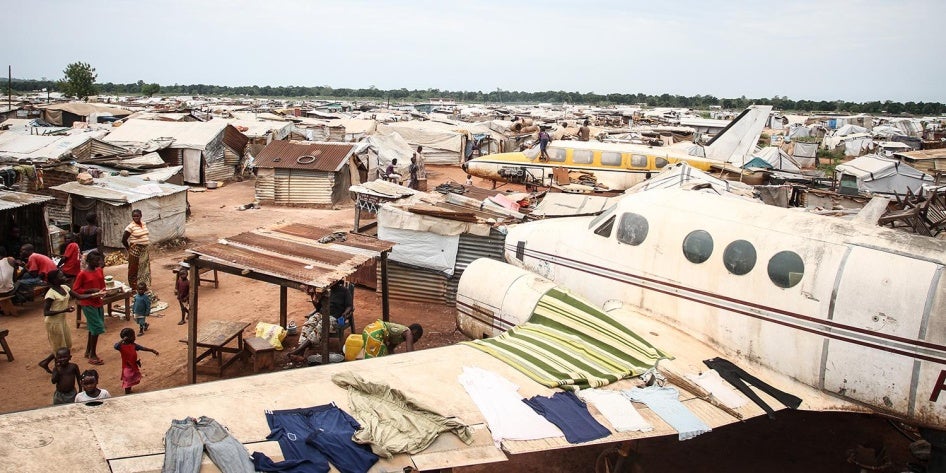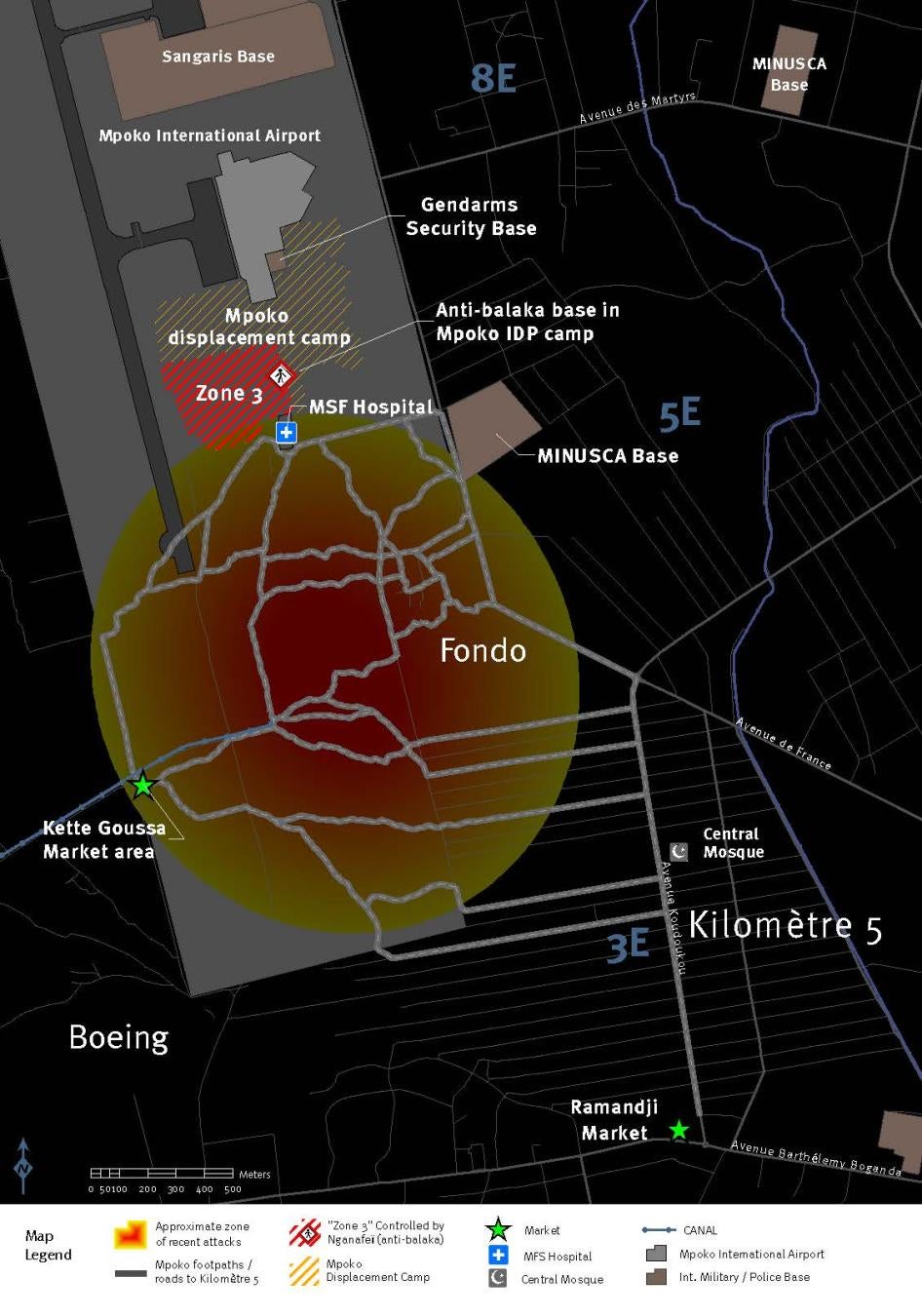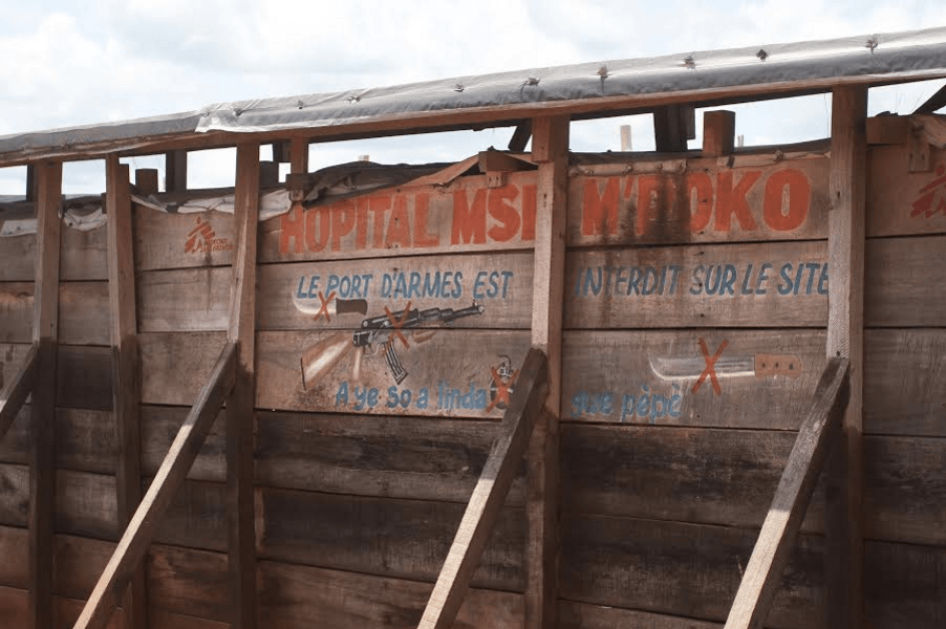(Nairobi) – The government of the Central African Republic and United Nations peacekeepers should urgently address sexual violence against women and girls by armed militia in the capital, Bangui. Human Rights Watch documented some cases in which perpetrators used rape to punish women and girls suspected of interacting with people on the other side of the sectarian divide.
In Bangui between December 1 and December 13, 2015, Human Rights Watch documented at least 25 cases of sexual violence since September 26, when a new wave of
sectarian violence gripped Bangui. The figures probably significantly underrepresent incidents of sexual violence, which are often not reported due to shame, stigma, or fear of retaliation. A UN-led interagency group
reported on December 10 that it had recorded thousands of sexual violence cases throughout the country in 2015, though the numbers require further verification.
“It is clear that sexual violence is a devastating element of the ongoing sectarian violence in the capital,” said
Lewis Mudge, Africa researcher at Human Rights Watch. “Transitional government authorities and UN peacekeepers should act to improve protection for woman and girls and to hold to account those responsible.”
Nine cases of sexual violence documented by Human Rights Watch occurred in and around M’poko
displacement camp, including in the field to the south of the camp and in the nearby Fondo neighborhood, all largely controlled by members of the mainly Christian and animist anti-balaka militia. M’poko camp, which borders M’poko International Airport, houses 20,000 internally displaced people and is managed by a humanitarian organization under the auspices of UNHCR, the UN refugee agency.
Victims said anti-balaka raped them as punishment because the anti-balaka believed they were buying from or selling to Muslims in the Kilomètre 5 enclave, the capital’s last remaining Muslim neighbourhood.
On September 27, the anti-balaka stopped a group of six women just south of the M’poko camp. One of the victims told Human Rights Watch that the anti-balaka said: “You are going to the market to sell vegetables to the Muslims so they can have the strength to come and kill us. We will now rape you so your Muslim friends will know you are already dead.” The men raped all the six women over several hours, some repeatedly by multiple attackers.
In another case, a victim identified one of her attackers as a combatant she knew and had seen in the camp with Emar Nganafeï, an anti-balaka leader active in M’poko camp. The 35-year-old victim said she had been raped in early October by two anti-balaka who accused her of selling vegetables in Kilomètre 5. Before raping her, one of her attackers said, “We will rape you and then you will not dare to put a foot in Kilomètre 5.” She has since repeatedly seen her attacker in M’poko camp.
Several humanitarian officials in M’poko camp told Human Rights Watch that Nganafeï operates an anti-balaka base near a hospital in an area known as Zone 3. “His group kidnaps and rapes women, sometimes they let them go, sometimes they ransom them to the families,” one official said.
Nine other witnesses also told Human Rights Watch that since September 26, at least six women and girls, and possibly as many as 18, had been held hostage by anti-balaka loyal to Nganafeï. Many were released after their families paid a ransom. One woman, kidnapped on September 30 and held for 14 hours, said Nganafeï himself had told her: “There is no order, we make the law. If your family does not pay, we will kill you.” Human Rights Watch has also received other credible reports that Nganafeï may be responsible for killing a number of men and women in or near M’poko camp in recent months.
M’poko camp is largely controlled by anti-balaka militia and has become increasingly violent since renewed sectarian violence began. Many aid agencies no longer go to the camp to provide assistance due to the danger. On December 9, at least 10 men, some of them armed, stormed and looted the hospital in the camp run by Doctors Without Borders, requiring it to temporarily suspend some activities.
Officials from the UN peacekeeping mission, MINUSCA, confirmed that peacekeepers do not provide security for the M’poko camp. The acting commander of MINUSCA’s Joint Taskforce in Bangui confirmed this in writing, providing no explanation. Civilian officials from MINUSCA and UNHCR told Human Rights Watch that this is in part because the mission is focusing its efforts on security for the upcoming elections, implying that the decision was to deploy finite resources to a different priority. The national public security minister told Human Rights Watch that Central African gendarmes will not enter the camp due to the danger of anti-balaka attacks.
UN peacekeepers are
mandated to provide “specific protection” to women and children affected by the conflict, including to prevent sexual violence and to assist in holding those responsible to account. At least 1,860 police and military peacekeepers are based in Bangui, with at least an additional 800 in reserve. The peacekeeping mission also has several advisers dedicated to monitoring, investigating and documenting conflict-related sexual violence.
Human Rights Watch also documented at least five cases since September 26 in which women and girls were raped by armed members of Muslim self-defense groups, some conducting revenge attacks against Christian and animist neighborhoods near the enclave, following murders of Muslims.
On November 15, a 26-year-old woman was raped by six armed Muslim men whom she identified as members of the Muslim self-defense group as she approached Ramandji market, in Kilomètre 5. According to the victim, the men approached her and asked the whereabouts of her husband. When she answered that he had been killed, one of her attackers said, “Oh, she was married to an anti-balaka, we can take her.” The victim then said, “Each one of the men took his turn to rape me while the others held me down. When they were finished they just pushed me to the side of the road.”
Only four rape survivors interviewed had sought any medical attention or received psychosocial support from trained service providers. The hospital in M’poko camp offers comprehensive post-rape psychosocial and medical care, including to prevent unwanted pregnancy and HIV. But some women said they were afraid that seeking medical help in the camp would lead to stigmatization; others said they did not know services were available or why it is critical to get them. Several said they still suffered the mental and physical effects of the violence.
The Central African Republic is scheduled to hold presidential and legislative elections on December 27, with a runoff round planned for January 31, 2016, if there is no clear winner. Many local human rights groups fear there may be new violence.
“Women and girls should be able to seek food or support their families without fear of sexual violence,” said
Hillary Margolis, women’s rights researcher at Human Rights Watch. “The government and peacekeepers both should be doing more to protect women and girls and to make sure that rape survivors get the help they need, including post rape care.”
The Conflict
The conflict in the Central African Republic began in March 2013, when the mostly Muslim Seleka rebels ousted the government of then-President Francois Bozizé. The Seleka’s rule was marked by widespread human rights
abuses. In mid-2013, mostly Christian and animist anti-balaka militias organized to fight against the Seleka and carried out large-scale reprisal
attacks against Muslim civilians across many parts of the country, including in Bangui.
The M’poko displacement camp was established in December 2013, when
violence swept Bangui as Seleka and anti-balaka fighters fought for control of the city. Tens of thousands of people fled to M’poko International Airport, creating an impromptu displacement camp. Since then, the camp population has fluctuated. At the peak of the fighting in 2013 and early 2014, some 100,000 displaced sought shelter there. In August 2015, it held approximately 10,000. After renewed fighting in September and
October, the population increased to around 20,000.
After December 2013, when the French forces pushed the Seleka out of Bangui, the Muslim community was largely unprotected and at the mercy of the anti-balaka. Muslims were
forced into enclaves, including one at Kilomètre 5, which currently has a population of about 15,000. Before the conflict, an estimated 122,000 Muslims lived in the capital.
In April, Human Rights Watch
documented the repeated rape and sexual slavery of Muslim Peuhls by anti-balaka groups in the country’s southwest. Human Rights Watch has also received information about sexual violence in central regions of the country, including around Mala and Kaga Bandoro, among others which require further verification.
Since September 2014, the International Criminal Court has been conducting investigations in the Central African Republic. The prosecutor, Fatou Bensouda, adopted a policy paper on sexual and gender crimes in June 2014 and pledged to make these crimes a priority in investigations by her office. In addition, a
Special Criminal Court, written into law by the transitional authorities, could help address impunity for grave international crimes, including sexual violence.
Witness Accounts, M’poko Camp, by Anti-Balaka
On November 29, 2015, a 27-year-old woman left the M’poko camp to buy food in Kilomètre 5. As she approached the Fondo neighborhood, near the Muslim enclave, a small group of anti-balaka stopped her, she said, saying, “You are going to buy things from the Arabs.” The men forced her, at gunpoint, into an abandoned house nearby and three of them raped her.
Around October 10, a 25-year-old woman left the M’poko camp with three other women to sell vegetables in Kilomètre 5, in the Boeing neighborhood. As they were returning, after passing the airport runway six armed anti-balaka stopped them:
The anti-balaka took our money and threw our vegetables on the ground and then one of them asked me, “Where are you going?” I lied and said, “It is for my family,” but he grabbed my throat and pushed me down. He raped me and the other women were raped as well…. Since then, I have not been to the hospital. I have not gone back to Boeing because it is unsafe. At both Boeing and M’poko there is no security.
On November 10, a 19-year-old woman left the camp to look for firewood in the remains of her home in nearby Fondo neighbourhood:
A group of anti-balaka found me and asked what I was doing there. I said I was gathering wood, but one said, “No. That is a lie. You were sent by the Muslims to spy on us.” I insisted that I lived at M’poko, but he said, “No, you sleep with the Muslims and since you came here on behalf of the Muslims, we will hurt you.” I tried to run, but one grabbed me and slapped me in the face…. My hands were tied behind my head and two of them raped me. I have not been to the doctor because I do not want people to know what happened. Since this happened to me my stomach hurts. When I think about it my heart beats fast and I get headaches.
On November 28, a 45-year-old woman from M’poko was taking manioc, a vegetable, to sell in the Ramandji market, in Kilomètre 5. Three armed anti-balaka stopped her outside the camp, accusing her of taking the manioc to Muslims:
One of the anti-balaka said, “I’m going to cut open your stomach.” Then he came and took the manioc from me…and they attacked me. One took me and held me by the arms. I was raped by three men.
She said she had not sought any medical or psychosocial care.
Around December 3, a 30-year-old woman left M’poko with her 3-year-old daughter for fields beyond Boeing, where she grows manioc. On her return, after she passed the airport runway, she came across a large group of armed anti-balaka:
The anti-balaka asked for money and I said I had none. One of them came and told my daughter to return to the camp alone. He said nothing to me, he just grabbed me and took me into the tall grass and raped me. I went home and told my husband, but he said he was embarrassed by me and he abandoned me. I do not want to go to the hospital because I am ashamed. I am nervous I will see the man who raped me and he will harm me again.
Around October 1, a 52-year-old woman left M’poko camp for her destroyed home in the third arrondissement to chop firewood from a tree on her property. As she was returning, anti-balaka stopped her in Fondo:
An anti-balaka said, “You, old woman, where are you coming from?” I was carrying wood on my head and an anti-balaka came and pushed it off. I fell on to the ground and hurt my knee. They started to kick me and yelled, “Beat her! She brings food to the Muslims!” They took 90,000 CFA (US$150) that had been given to me by the UN to rebuild my home. It was all the money I had left. They beat me and made me wait on the road. Finally they let me go and said, “If we see you again, we are going to kill you.”
In mid-October three women from the third arrondissement went to the market in Combattants neighborhood, near the airport, to buy vegetables. On their return, they attempted to take a shortcut through the M’poko camp. Anti-balaka surrounded them as soon as they entered the camp. Human Rights Watch spoke separately with all three women. One said:
The anti-balaka were yelling, “These are Christians who stay with the Muslims! Catch them!” They hit us and took us to the tent of their leader.… He pointed his pistols at us and said, “These are our sisters who married Muslims. Get them away from me before I kill them.” He said he would kill us by 5 p.m. if our families did not pay him and ordered us to be held in a small wooden shop near his base. While we were held his men yelled at us, “The only way to walk out of here is with your tendons cut or if you pay 100,000CFA (US$167).”
The women’s families arranged to pay 30,000CFA (US$50) and they were released. However, all three women reported that there were several other women held captive in the same kiosk, some with infants, whose fate is not known.
On November 22, a 35-year-old woman left M’poko to sell vegetables at Kilomètre 5. As she approached Fondo neighborhood, she was surprised by 12 armed anti-balaka fighters:
They took my money and threw my merchandise on the ground. They put me in a small shop near Nganafeï’s base and held me there from 9 a.m. to 9 p.m. One of them said to me, “You know it is forbidden to go and sell to the Muslims. If we want we can just kill you.” My family heard I was being held and they came to see me, but the anti-balaka said, “No, if you do not pay, she will not leave.” They managed to collect 25,000CFA [US$42] and in the evening I was let go.
Witness Accounts, Kilometre 5, by Muslim Self-Defense Groups
On November 20, a 29-year-old woman left M’poko to go to work in her abandoned home’s garden in the third arrondissement:
I was gathering vegetables in the garden when I heard a noise. Then there were Muslim fighters all around me. Six of them came toward me. One said, “We are not going to kill her – we are going to rape her to hurt her husband.” One man then grabbed my dress and tore it off, another one took my slip off, and another pushed me to the ground. When I fell down two came and held my arms to the ground. One man raped me, then a second, then a third raped me. Then a fourth said he was going to take his part. After, I tried to get up. I fell and hurt my foot…. I was in shock. I couldn’t get up. I crawled on my knees. I found a young man. He asked what I was doing there and he transported me on his back to M’poko…. I am worried because I don’t know if one of my attackers was sick with HIV.
On November 28, a 16-year-old girl left M’poko for Kilomètre 5 to look for personal items at her family’s home:
As I was moving in the grass, I saw four Muslims. They were armed with Kalashnikov rifles and machetes. All four were from Kilomètre 5. When they saw me one of them said, “If you do not have sex with us we will kill you.” They took me and raped me. It still hurts me in my stomach. It hurts when I lie down in bed. I just try to sleep when the pain gets too much…. I am scared to go to the hospital because people will know what happened to me.











